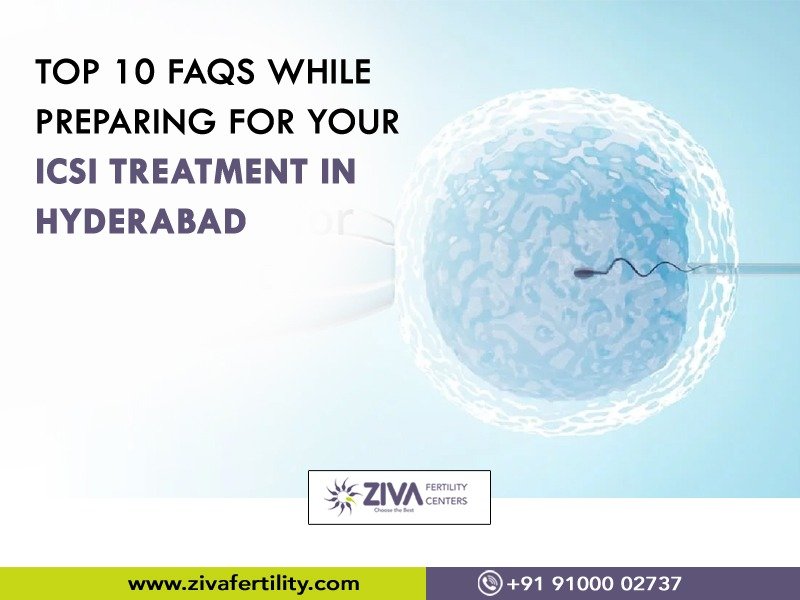The main concept behind an Intracytoplasmic sperm injection, or ICSI, is injecting a single live sperm directly into the centre of a human egg. This technique is a boon to couples with severe male factor infertility or couples who did not get success in previous IVF attempts. This procedure succeeds because many steps involved in natural fertilisation are bypassed. In this blog, we will understand what information you should possess while preparing for an ICSI treatment.

1. How should I prepare for an ICSI?
The female partner is given fertility medication for ovarian stimulation so that several mature eggs develop. The matured eggs released during ovulation are aspirated through the vagina using vaginal ultrasound and incubated under precise conditions in the embryology laboratory.
The male partner provides the semen sample, or donor sperm can also be used. The live sperm are separated from debris or dead sperm by centrifuging or spinning the sperm cells through a special medium. An experienced embryologist can pick up a single live sperm in a glass needle and inject it directly into the egg.
2. When should I think of ICSI?
ICSI is the main treatment choice in the case of male factor infertility with an abnormal semen analysis. ICSI opted under the following scenarios :
- Failure of fertilisation with previous IVF cycles
- Sperm count is not constant
- Undetermined infertility
- Maximise success in the first attempt when the procedure is not indicated.
- Vasectomy reversal because of the presence of sperm antibodies that may affect fertilisation.
3. What is split ICSI?
Split ICSI involves performing ICSI on the majority of all mature eggs and incubating the remainder with sperm. Split ICSI is a safety net against failed fertilisation with standard insemination. A minimum number of mature eggs are required for split ICS. A minimum of eight mature eggs are needed on the day of your egg retrieval to proceed with split ICSI.
4. How successful is ICSI?
Fertilisation rates with ICSI are about, and pregnancy rates are comparable to those seen with IVF in couples with no male factor infertility. This means, on average, eight of every 10 eggs fertilise normally.
5. What are the risks of ICSI?
Usually, less than 5 per cent have a chance of damage during needle insertion. There is an 8 per 1000 chance of the baby having a chromosomal abnormality in the X or Y chromosomes. The reason for this increased risk is yet to be determined.
The risk of Down’s syndrome is not increased with ICSI but increases with maternal age.
6. Will all of my eggs be injected?
If you proceed with ICSI, only mature eggs can be injected with sperm. Our highly experienced ZIVA embryologists can easily tell if an egg is mature or immature. The immature eggs are incubated with sperm but may not fertilise, so on average, 75 per cent to 80 per cent of the eggs are injected.
7. Should I expect any difference in embryo quality or pregnancy between ICSI and non-ICSI methods?
There appears to be no difference in the overall embryo quality and pregnancy rates achieved with ICSI embryos compared to non-ICSI embryos. Many infertility specialists have observed that with ICSI, the embryo yield from a given number of eggs recovered was more. Hence, the increase in ICSI procedures.
8. What is the difference between an IVF and ICSI?

Both these procedures are ARTs. However, ICSI is done as part of IVF. All the steps of IVF are followed in an ICSI. Still, in an ICSI, the embryologist selects a good quality sperm to inject directly into the egg outside in a laboratory setup. In a traditional IVF, fertilisation occurs in a petri dish where multiple sperm are placed near a mature egg.
9. What are the advantages of ICSI treatment?
Traditional fertilisation requires many male and female reproductive organs to be in perfect condition. ICSI is a boon to men dealing with low sperm count, poor motility, or other sperm-related problems. Men who are paralysed and wish to have biological children benefit hugely from ICSI. A Failed IVF is no longer a reason to give up hope.
10.For how long should I rest after an ICSI treatment?
The ICSI is done within two to three days of fertilisation. You must be relaxed, avoid stressful activities, eat a well-balanced diet as recommended, and meditate to calm your mind and body. Complete bed rest is not needed. Just maintain a relaxed body and a positive mind.
At the ZIVA Fertility Clinic, we have handled several ICSI cases for various fertility problems. We also do patient counselling before starting the treatment. Make sure that supportive family and friends surround you. Please visit our website https://zivafertility.com/ or contact us at +91-9100002737, +91-9392834024, and info@zivafertility.com
















